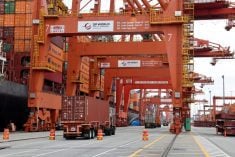BEIJING, Dec 8 (Reuters) – China’s imports of commodities surged unexpectedly last month putting the world’s second-largest economy on track to set records for shipments of soybeans, iron ore and coal even as concerns linger about slowing economic growth.
China, the world’s largest soy buyer, imported 7.84 million tonnes of soybeans in November, the highest in nearly a year, government data showed on Thursday, as crushers replenished stocks ahead of the peak consumption period.
Imports surged 50.5 percent from October and were six percent higher than November last year, figures from the General Administration of Customs of China showed. It was the loftiest since December last year.
Read Also

Canadian trade data delayed by U.S. government shutdown
Canadian international trade data for September will be delayed indefinitely due to the ongoing partial shutdown of the United States government, Statistics Canada said Friday, Oct. 24.
The big month-on-month jump reflected the arrival of beans that were delayed from October due to longer shipping routes.
Analysts said the buying spree could continue into December, reaching as high as nine million tonnes. The current record of 9.5 million tonnes was set in July 2015.
Winter is usually the busiest for imports as the U.S. crop hits the market at the same time as demand from Chinese hog farmers surges ahead of Chinese Lunar New Year. The week-long Spring festival starts at the end of January 2017.
“Due to the early Spring Festival, the overall arrivals are much larger than last year,” said Monica Tu, analyst at JCI.
In iron ore, the surge to one of the highest on record was partly due to the arrival of shipments delayed by the week-long Golden Week festival at the end of October.
Still, the buying was surprisingly strong even as steel mills and copper fabricators prepared to slow output for weaker demand from the construction sector during the winter months.
“The rise in copper imports reflected in part a rise in Shanghai Futures Exchange inventories and stronger demand from the Chinese power and construction sectors,” said Vivek Dhar, commodities analyst with Commonweealth Bank of Australia in Melbourne.
The buying helped spur a 6.7 percent rise in China’s total imports, easily eclipsing economists’ expectations for a drop of 1.3 percent and its biggest gain since September 2014.
Independent oil refiners with newly granted quotas bought more foreign crude even as oil prices rebounded ahead of expected output cuts by major producing nations, while utilities ramped up their coal purchases as government-enforced mine closures continued to hurt domestic supplies.
With the major consumers locked into long-term contracts at big discounts to the cash price and local miners increasing output, the months-long buying may ebb in December, traders said.
In fact, the buying spree across commodities may not continue into December as consumers destock ahead of the holiday at the end of January and the weak yuan makes imports less attractive.
“The debate dividing the market is whether this growth can be sustained into next year, or will things flatten out,” said Dhar.
Still China’s major markets including soybeans, coal and iron ore, were on pace for record-setting shipments for the full year.
Imports of the steelmaking raw material reached 935 million tonnes in January-November, putting it on track to top 1 billion tonnes this year and surpass the record 952.84 million tonnes in 2015.














